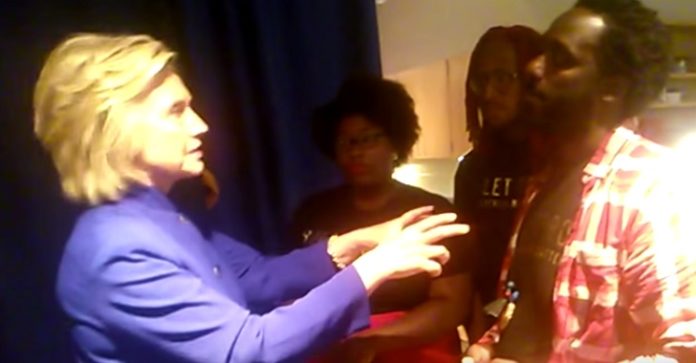
Written by Carey Wedler at theantimedia.org
Last week, Chicago Black Lives Matter activists questioned Hillary Clinton at a New Hampshire campaign event about America’s mass incarceration problem, which undeniably bears racist undertones. Clinton provided a predictably calculated, talking-point ridden response, skillfully ignoring the crux of his point: that Clinton herself helped create this catastrophic dilemma.
In the exclusive video obtained by GOOD Magazine, an activist expresses his happiness that he is able to speak with Clinton.
He then quickly references her recent denunciation of the prison-industrial complex and argues that “America’s first drug is free black labor and and turning black bodies into profit. And the mass incarceration system mirrors an awful lot like the prison plantation system.” The activist says that until white America acknowledges “anti-blackness as a founding problem in this country, there will not be a solution.”
“Mmmhmm,” Clinton intones multiple times as she nods in agreement with his statement.
He then politely calls her out for her past support of policies that helped to create America’s prison problem. A title slide in the video appears:
“Hillary Clinton lobbied Congress to pass the Violent Crime Control and Law Enforcement Act. Bill Clinton signed the act into law in 1994...The largest crime bill in history, it provided $9.7 billion in prison funding. From 1992 to 2000, the amount of prisoners in the U.S. increased almost 60%,” it reads.
The activist asks Clinton to explain her recent “change of heart” on the issue and to discuss how what she learned could help America and black citizens as a whole.
Clinton begins her response, providing self-aggrandizing deflections to obfuscate the question at hand. First, she draws upon the children, citing her efforts through the Children’s Defense Fund to “give kids, particularly poor kids, particularly black kids and Hispanic kids, the same chance to live up to their own God-given potential as any other kid.”
She acknowledges America’s “original sin” of institutionalized racism and goes on to dictate a lesson on social progress. Clinton purports to be very knowledgeable about the subject, citing past minority movements and their ability to formulate a plan to further their cause. Eager to insert a talking point about her record of caring about the disenfranchised, she says, “Obviously, I know more about the civil rights movement in the old days because I had a lot of involvement in working with people…”
She argues that activists today need a plan of action to deal with issues facing black America, all the while flattering their passion and efforts to elevate consciousness.
Ironically, she notes that “You can get any white person to pay lip service” to black concerns, which is exactly what she did to the activist questioning her.
Clinton failed to acknowledge his initial question about her apparent change of heart (read: opportunistic decision to jump on the trend against mass incarceration). She failed to so much as recognize the fact that shecontributed to the problem she now claims to want to solve.
Clinton has helped create the world’s largest prison population not only by lobbying for the 1994 law referenced in the video, but by accepting money from the private prison lobby which has even continued to flood into her 2016 presidential campaign. She has also supported the Drug War, which has indisputably led to America’s over-bloated prison population, sending more non-violent black people behind bars than any other group per capita. She has also supported aggressive foreign policy, which has increased American militarism and provided a steady stream of military equipment to local police through the 1033 program, which began as an effort to bolster the war on drugs.
In part two of the conversation, the activist accuses Clinton of victim-blaming for the way she attempted to dictate how activists should present the issue and formulate a plan of action. Regardless of whether or not her observation was correct, he argues that if she stops telling black people what to do, they will stop telling “you all” what to do.
“I don’t believe you change hearts. I believe you change laws,” she retorts. “You change allocation of resources, you change the way systems operate.” After finishing her statements, she hustles away with her handlers.
What Hillary Clinton ignorantly refuses to acknowledge is that laws have utterly failed to end racism and institutionalized racial disparity. The Civil Rights Act was passed in 1964, and while it ended state mandated racial segregation and sought to address social inequity, the fact is that segregation still exists in America’s cities (especially in the North East) and racial inequality is nowhere near being solved.
While the media focuses on Clinton’s email scandal (an issue conservatives can loathe her for while ignoring bipartisan corruption regarding the war machine and corporatism), Clinton continues to shirk issues that actually matter while contributing to their exacerbation and “the way systems operate.”
This article (Activist Tells Hillary to Her Face That She’s Responsible for Mass Incarceration) is free and open source. You have permission to republish this article under a Creative Commons license with attribution to Carey Wedler andtheAntiMedia.org. Anti-Media Radio airs weeknights at 11pm Eastern/8pm Pacific. If you spot a typo, email[email protected].
Carey Wedler joined Anti-Media as an independent journalist in September of 2014. As a senior editor, her topics of interest include the police and warfare states, the Drug War, the relevance of history to current problems and solutions, and positive developments that drive humanity forward. She currently resides in Los Angeles, California, where she was born and raised. Learn more about Wedler here!




